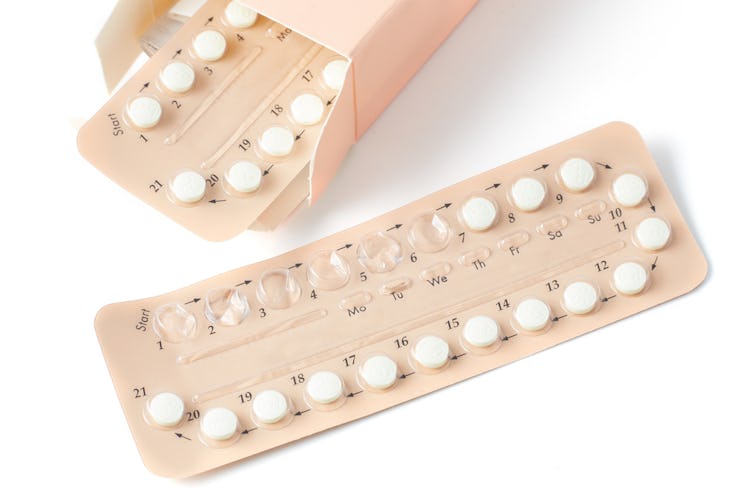
This Is What The Placebo Pills In Your Birth Control Pack Are Actually Made Of
Birth control is, for many people, a life-changing form of scientific magic. As fantastic and empowering as it is to have the ability to take control of your sex life and reproductive health, it's crucial to fully understand the actual science behind that magic. Knowledge is unequivocal power, and no matter how much you think you may know, there will always be lingering questions that need answers. One such question revolves around those final four rows of pills in your monthly birth control packet: What are birth control placebo pills made of?
Even though more than 100 million women across the globe use contraceptive pills, the truth is that there are a lot of untruths being circulated around placebo pills in a birth control pack.
The first thing you should know about placebo pills is what they're not: They're not uniform sugar pills, which is one of the more widely circulated myths about that final week in your pill pack. Another common myth is that they have no active ingredients.
The truth is that all placebo pills are slightly different. The manufacturer of the drug also gets to manufacture the placebo pills that go along with it, so although the main ingredient is usually sugar, it's not the same chemical formula each time.
Having said that, in relation to your birth control strategy, the placebos are, for all intents and purposes, placeholders.
Whether you take these pills or not doesn't really matter. In most cases, they're just there to help you keep up the routine up of taking a pill every single day. If you really preferred, you could take a pill every day for three weeks then take a full week off every month.
Most placebo pills don't have any hormones, which is why you get your period during that last week of the pack. However, some placebo pills could have a very low dosage of estrogen (low enough to still allow your period to happen), depending on which type of birth control you're taking, so be sure you speak to your doctor about what your own pills are actually made of.
Overall, think of the placebo pill this way: It isn't actively doing anything to you, so much as it's passively allowing your body to continue about its business.
In that case, what actually happens if you skip the placebos altogether?
Contrary to what many people believe, it's totally fine to skip the fourth week and immediately continue on with your next pack of birth control pills.
Many women do this to avoid bleeding altogether, and in terms of your health and well-being, it's completely safe.
However, skipping the placebo and strictly using birth control pills to delay your period has some disadvantages: It might lead to spotting, and it can make it harder for you to definitively know if you're pregnant or not (since it's still technically possible to get pregnant on the pill).
No matter what, you should consult your doctor before deciding to skip the placebo pills altogether. Each body can respond differently to the effects of birth control, so your decision to avoid or take the placebo pill should be based on how your body reacts specifically, and what your doctor recommends, not just on any generalized information you read online.
At the end of the day, the placebo pill should be viewed as your friend, rather than an enemy to outsmart.
It can be difficult for even the most Type A humans to remember to take a pill every single day without fail, and since doing this is paramount to having a successful birth control strategy, the placebo pill is there to keep your routine up and running.
Whether you're for or against placebo weeks, there's a birth control packet for you. Birth control pills come in 21-pill packets, as well as 28-pill packets, depending on whether or not you feel like having a placebo week.
If all of this pill talk is making your head spin, it might be time to consider an alternate form of birth control, like the shot (which only requires a new injection every three months) or the IUD (which keeps you protected for years after the insertion).
All in all, don't sweat the placebo. It's all a part of the birth control magic, and by magic I mean a finely tuned science that we should respect, revere, and use to make the world a better place.